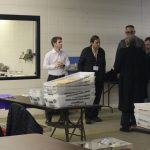Adams’ metaphysical “Harmonium”
I met John Adams just once, in 1997. We talked about his Gnarly Buttons, the clarinet concerto that Present Music had co-commissioned with the London Sinfonietta, and which Present Music and Bill Helmers were about to play. After the interview, we spent an hour walking around downtown Milwaukee and talking about architecture, urban planning, economics, politics and aesthetics. Adams was stimulating, engaging and knowledgeable on every topic. A humane perspective permeated his thinking. Behind his opinions was the question, sometimes implicit and sometimes explicit: How could this make life better for all of us?
I thought of that again Tuesday (March 1) as I listened to his Harmonium, which music director Edo de Waart, the Milwaukee Symphony and the Milwaukee Symphony Chorus will perform Friday and Saturday (March 4-5). The dazzling soundworld of the piece, the masterful orchestration, the deft balance of variety and unity, the momentum and through line that carry you through 35 minutes in no time at all make this a very good piece of music.
And it’s more than that. In Harmonium, Adams goes for something elusive, something metaphysical. The music creates an aura of a higher reality, of something just beyond peripheral vision, of something real and important that would dissolve if observed directly. Poets and zen masters have gone at it obliquely for generations. In more modern times, painters and composers such as Mark Rothko and Olivier Messaien have hinted at it. (Trying to capture it is futile.)
Poems by John Donne (1572-1631) and Emily Dickinson (1830-1886) inspired Adams. In Harmonium, the chorus sings the text of Donne’s Negative Love or The Nothing and Dickinson’s Because I Could Not Stop for Death and Wild Nights. (Read all three poems complete and Adams’ fascinating notes on the piece here.)
The key to Adams’ thinking lies in his remark about the Donne poem: “Every time I read it, it seemed to mean something different.” That statement, like Donne’s enigmatic poem, speaks to the mystery of ordinary existence, the miracle of the way things are. Donne tries to imagine love so transcendent that the self disappears into it. Perfect love = perfect nothingness. With the self negated, where is the love? Donne felt such yearning for the divine and tried to express it specifically and landed on a fascinating riddle. Most people, we can suppose, feel that yearning vaguely if at all, until some ancient liturgy, a bird’s song, the light in a cathedral, a Rothko painting, or John Adams’ Harmonium stirs it to life.
Edo de Waart has a special relationship with this piece. He was music director of the San Francisco Symphony while Adams was composer in residence there. De Waart led the first performance of it, on April 15, 1981, and he remains a leading interpreter of Adams’ music. This will be the MSO’s second time around with Harmonium. Andreas Delfs led the last performance of it, in June 2001.
Beethoven’s Symphony No. 3 (“Eroica”) and Samuel Barber’s Adagio for Strings are also on this program, which will begin at 8 p.m. Friday and Saturday at Marcus Center Uihlein Hall. Tickets are $25-$95 at the MSO website; at the MSO ticket line, 414 291-7605; and at the Marcus Center box office, 414 273-7206.















